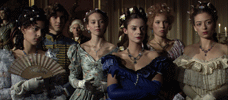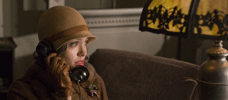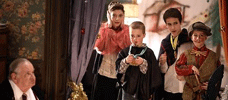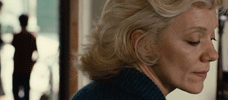Reviews
Un Conte de Noël
Arnaud Desplechin
France, 2008
Credits
Review by Leo Goldsmith
Posted on 15 October 2008
Source IFC Films 35mm Print
Related articles
Screening Logs
Categories The 46th New York Film Festival
When I was a boy, my aunt in Norway sent us a Christmas Advent calendar, which my mother hung in the kitchen every December. It wasn’t like the cheap, plastic-and-cardboard kind you usually find—she had made it by hand from burlap, with twenty-four pockets trimmed with strips of felt and small bells and depictions of elves and various Christmas confections. As the holiday approached, we would dig from the appropriate burlap pocket the tiny present - pencils and erasers, little chocolates, gadgets, and small treasures - that my mother had hidden there, stoking our fluttering anticipation of Christmas morning, at least for one day. Often she would make a game of it, putting a clue or a small note in the pocket, a treasure map to the place in the house where the present was hidden - behind the sofa, under the armoire, in a special drawer - and my brother and I would hunt them down like lost artifacts or secret relics. It must have been an exasperating experience for my mother—our pirates’ lust for this treasure was insatiable, and we’d probably squabble over what we found. But hopefully the experience was not without its own rewards, and once Christmas had passed, a temporary détente would be reached, at least until next year.
I’m reminded of this because of Arnaud Desplechin’s new film, A Christmas Tale, whose structure, the director says, was conceived to be that of an advent calendar. I can’t think Desplechin had my (or, I should say, our) advent calendar as his architectural conceit, but it’s interesting that his film is very much about the treasured territories of the home with its mysteries and mythologies, and its place as a character in the dramatis personae of the family’s life. But unlike in our advent calendar, the many little gifts of Desplechin’s film don’t hide behind sofas or in the forgotten cracks of the Vuillard family’s warm and cavernous home. Each in succession, the curiosities of A Christmas Tale burst from the surface of the film, almost incapable of containing themselves, their passions, their disappointments, their awkward eruptions of alcoholic rage and familial resentment. Desplechin’s characters - with their many moods and emotions, problems and intrigues - are difficult to contain, a family of exuberants and melancholiacs; drunks and despots; healers and romantics; mothers, fathers, sons, and daughters.
Unlike most Christmas-themed films, Desplechin’s begins with disease: the leukemia that claimed the life of the Vuillard’s first-born, Joseph, when he was only six, and the bone-marrow cancer that’s now attacking the family matriarch, Junon (played by Catherine Deneuve). Just as Joseph’s disease prompted the birth of the Vuillard’s youngest child, this new affliction also brings surprising dividends, as Junon’s search among her immediate family for a compatible bone-marrow donor suddenly becomes an occasion to bring the somewhat fractured Vuillards together again in the family household: Junon and her husband, Abel; the oldest child, Elizabeth, and her angsty son, Paul; the youngest child, Ivan, his wife Sylvia, and their young boys, Basile and Baptiste; Junon’s nephew Simon, a painter; and, last but not least, Henri, the middle child, whom Elizabeth had banished from the family five years ago.
There are many hidden conflicts, romances, and resentments in the Vuillard household - most of which are worn lightly, nearly all of which are openly contested - and Desplechin and his frequent collaborator Emmanuel Bourdieu (son of Pierre Bourdieu) are able to give each his due, fleshing out at least nine central characters in restless, darting strokes, where most films can only manage one or two. The question of Henri’s return, however, forms the film’s loud, hilarious, appalling center. Played by Desplechin regular Mathieu Amalric - his eyes wired with mania and self-hatred, his face grinning pathologically, his slightly diminutive frame a bizarre combination of volatility and unshakeable self-assurance - Henri has a voluminous capacity for alcohol and a patent incapacity to shut up, shamelessly decrying his banishment at every opportunity, calling out the dour Elizabeth’s frigidity, and insensitively deriding Paul, her unstable son.
Of course, this inappropriate volubility is a family trait—Junon’s illness and treatment are widely batted around in a series of mathematical calculations, and even Junon introduces herself to Henri’s beyond-insouciant girlfriend Faunia (played by Emmanuelle Devos, another longtime Desplechin player) by saying, “I’m the one with the cancer.” This constant need to speak aloud - to claim one’s disease, one’s life, one’s space - is an imperative for all of the characters in A Christmas Tale, each competing for her own place in the family, for control over his own story. As a “tale” - sometimes figured as a puppet show narrated by Elizabeth (who is a playwright by profession), or as a confession to her therapist; occasionally narrated by other characters in the form of soliloquies, letters, quotations from Nietzsche, Emerson, Seamus Heaney, and others - the film often becomes a battle for narrative control, a struggle to determine who will take on the responsibility or the authority of telling the family’s story.
Each character stakes his own narrational claim over their part of the tale: Abel casts Joseph’s death, not as a tragedy, but as a source of “boundless joy”; Ivan feels he must help Paul because he underwent a similar depression at the same age; Sylvia resents the decisions made for her earlier in life that have changed her life’s story without her consent or knowledge; the meaning of Simon’s life is bound up in a love he cannot claim as his own; and even Junon must decide to accept or reject transfusion from one or another character as a way of directing her own story, or of letting others do so for her. In this way, characters persistently attempt to “invent” other characters, while others resist such claims upon them: Henri resents that Elizabeth has tried to exclude him from the story of his family; Elizabeth, calling Henri “the devil,” a personification of the family’s own congenital disease, similarly resents the control he has wielded over her family’s life and her own.
A Christmas Tale announces itself as a narrative in a process of metamorphosis: for Elizabeth, “it’s a metaphor - but a metaphor for what?”; for Henri, “we are in the midst of a myth, but I don’t know what kind of myth it is.” Amid the many struggles to tell this story, to set its course and define its parameters, there is always chaos and chance, the many unforeseeable outcomes that Abel and Elizabeth’s husband Claude coldly calculate on a blackboard to determine the various probabilities of Junon’s fate. But against this chaos and unpredictability, the film proposes life is also a game of chance, one that must either be played or else forfeited entirely. Desplechin suggests this conflict between disorder and play in myriad tiny ways—the chaos of Cecil Taylor’s “Bulbs” contrasted with the subtle harmonies of Charlie Mingus’ “Reincarnation of a Lovebird,” and Basile and Baptiste’s Christmas pageant about an evil prince in exile competing with the real thing upstairs.
The coalescent forces of music, art, family, theater, and even filmmaking - as well as all the dye-making, painting, interior design, and fashion that flood the film with visual texture - are the only ways of staving off this death and chaos, and Desplechin’s film proposes that this is best achieved by a collaborative, and not individual), will. And for Desplechin, the home is the site of this collective will, an aggregator of these different elements, personalities, and stories, and a shared space. Elizabeth has her dollhouse version of the Vuillard home, and Henri significantly repels from its outer walls, failing to use the stairs “like a normal person.” But neither character exists outside of the home’s narrative or can claim it as his own, and any small victory in these struggles for dominance, for control of this place, this family, and this story, cannot remain triumphant for very long. Desplechin’s film follows this story as a game without end, without definitive victories or defeats, whose joy is less in its outcome than in its unfolding.
More The 46th New York Film Festival
-

Wendy and Lucy
2008 -

The Northern Land
2008 -

The Last Command
1928 -

Hunger
2008 -

Lola Montès
1955 -

Summer Hours
2008 -

Gomorrah
2008 -

Changeling
2008 -

Che
2008 -

I’m Gonna Explode
2008 -

Waltz with Bashir
2008 -

Happy-Go-Lucky
2008 -

The Windmill Movie
2008 -

Tulpan
2008 -

Afterschool
2008 -

A Christmas Tale
2008 -

The Headless Woman
2008 -

Bullet in the Head
2008 -

Four Nights with Anna
2008 -

Night and Day
2008 -

The Class
2008
We don’t do comments anymore, but you may contact us here or find us on Twitter or Facebook.



